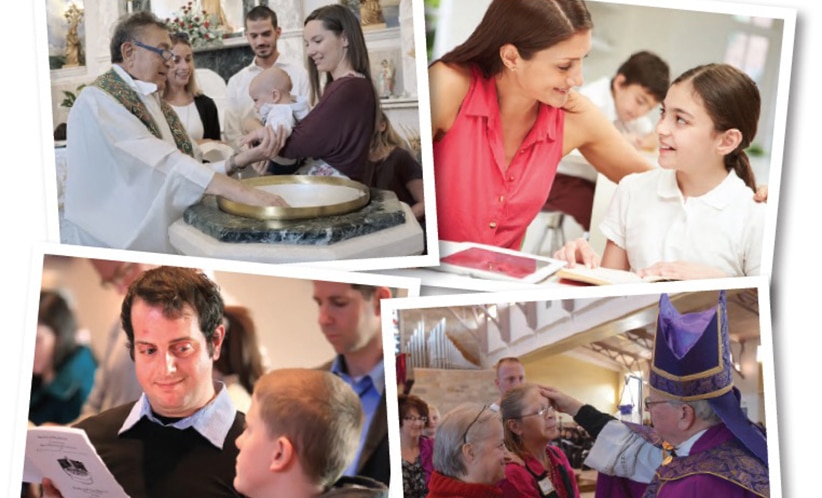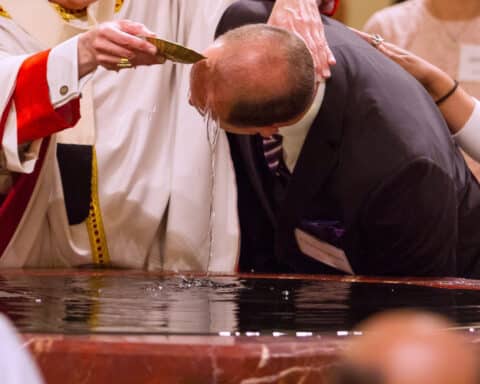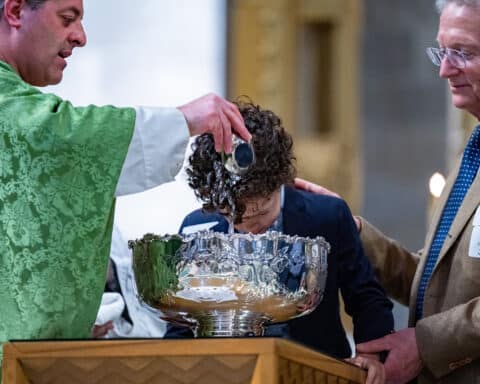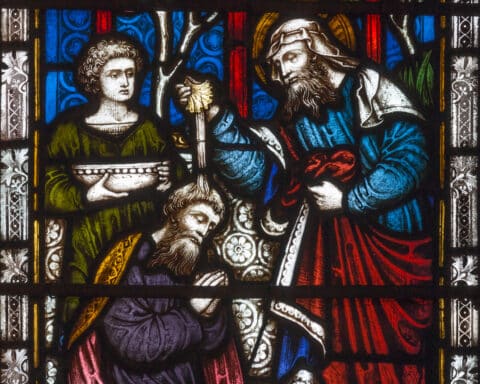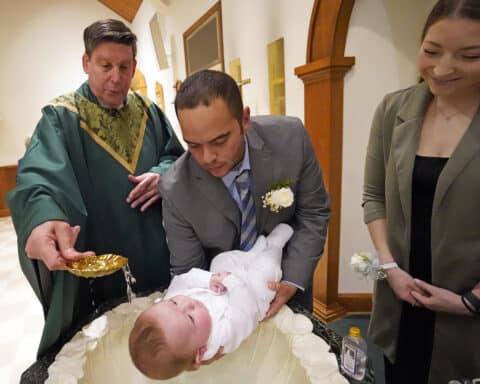Throughout Church history, devoted Catholics have offered guidance to men and women seeking the peace and love of Christianity. Similarly, Catholic Christians have provided assistance to others who, uncertain in their faith walk, have sought out the certitude of Catholicism. These people of God offering direction may be family, friends, teachers and even strangers. They are all eager to witness to Jesus, willing to help others experience the Christian life, find the Church and step onto the road leading to eternal life with Christ. The faithful Catholics assisting others along this journey we know as sponsors.
Terminology
The Church often uses the terms “sponsors” and “godparents” interchangeably. For example, sponsors at a baptism, either for an adult or infant, are known as godparents. While the term “godparent” (or godfather or godmother) at an infant baptism is familiar, some of us don’t realize that the person assisting at an adult baptism is also called a godparent. By whatever name, being a sponsor assumes a special responsibility in the Catholic faith and thus selection is carefully contemplated.
The terms “catechumen” and “candidate,” closely tied to sponsors and godparents, often need clarification. A catechumen is a non-baptized person seeking baptism, full communion with the Catholic Church, and is typically entered into a formal course of instruction called the Rite of Christian Initiation of Adults (RCIA).
Conversely, the baptized person desiring to join the Church by receiving the Sacraments of Reconciliation, Confirmation and Eucharist is known as a candidate. Dependent on his or her Christian education, the candidate’s instruction may be less than the catechumen’s. The Church is very explicit that we not confuse a candidate with a catechumen. Anyone seeking to join the Catholic Church — catechumen, candidate, even a baptized Catholic child attending a confirmation or religious education class – has a sponsor, someone who helps guide them on their faith journey. The sponsor is the face of the Church.
Early Church sponsors
In the early years of the Church, it was not easy to become a Christian. For the first four centuries, until the time of Emperor Constantine (r. 306-37), the Romans persecuted those choosing to follow the teachings of Jesus Christ. While the severity of the persecution varied depending on the emperor, seeking out and joining a Christian community was risky. Christians were viewed by many Romans and Jews as a disloyal secret society holding mysterious services, eating and drinking what they called the body and blood of the Nazarene Jesus, the one who had been crucified as a political criminal. These Christians had only one God and refused to worship the emperor, burn incense before a Roman idol or participate in pagan activities.
The threat of persecution caused the Christians to be careful about accepting others into their community; the fear was that someone could infiltrate and then identify their members to local officials. Saul, before he became St. Paul, is an example of the kind of person the Christians sought to avoid. Even after Paul’s conversion they worried about him: “When he arrived in Jerusalem he tried to join the disciples, but they were all afraid of him, not believing that he was a disciple” (Acts 9:26).
Christians were cautious and worshipped covertly. Anyone who wanted to join their community was carefully evaluated; in the vernacular of today, they were “vetted.” Each person who came forward, called an inquirer, was always accompanied by someone already Christian, a sponsor, who would vouch for the inquirer. The sponsor specifically attested to the person’s sincerity and moral character. St. Hippolytus (170-237 AD), in his discourse, “Apostolic Tradition” (Cambridge University Press, $31.99) wrote: “New converts to the Faith, who are to be admitted as hearers of the word, shall be brought to the teachers before the people assemble. And they shall be examined as to their reason for embracing the Faith, and those who bring them shall testify that they are competent to hear the word.” Having received the testimony of the sponsor, the Church leaders would further evaluate the one seeking to become a Christian. These persons would be asked about their lifestyle and occupation. Certain lifestyles would eliminate the person unless he or she promised to change the way they lived: prostitutes, soldiers, gladiators, sculptors of idol figures, actors, charioteers and others were rejected. Every Christian community wanted to share the Good News and expand the number of believers, but at the same time they sought complete candor and sincerity from the inquirer. Thus the role of sponsors was essential.
Same instruction
Assuming the inquirer satisfied the Church leaders, that individual would become known as a catechumen (from a Greek word meaning “instruction”) and started three years of spiritual formation and instruction in Christianity. Several Church fathers have verified the three-year timeframe, including St. Hippolytus: “Let the catechumen be three years hearing the word; but if a man is zealous and perseveres well in the word, it is not time but his character that is decisive.” Throughout the period of instruction the sponsor accompanied the inquirer and offered guidance, direction and, ideally, a model for living the teachings of Christ.
Among the early sources of Christian instruction was a book written in the first century called the Didache, or “The Teaching of the Twelve Apostles.” The Didache purports to be an instruction based on sayings of the Lord and given by the Twelve Apostles to pagans who wished to become Christians. This guidance and the writings of many Church Fathers such as St. Cyril of Jerusalem (313-86) and St. Augustine (354-430) also include instructions that are, even today, provided to those seeking to join the Church.
In addition to preaching and teaching, the early inquirer was exposed to a community of Christians and ideally formed into a follower of Christ. During the three-year period, the catechumens were continuously evaluated as to whether or not they were living a Christian lifestyle. Could the sponsor recognize a spiritual transformation taking place in the catechumen? Was he or she ready for baptism? St. Augustine argued against those who wanted to teach inquirers “only what they needed to believe” and “after baptism instruct them in what they must do to live a good Christian life.”
According to a fourth-century pilgrim to the Holy Land named Etheria, on the first day of Lent those seeking baptism were brought before the bishop, who would ask neighbors and sponsors about these individuals’ lives and virtues. If the bishop was satisfied, then the person would become a chosen one for baptism. Today that chosen one is known as the elect.
After Constantine ended all religious persecution, the numbers of people seeking to become Christians greatly increased and the style of instruction leading to conversion changed over the centuries. The Second Vatican Council would resurrect the formal catechumenate of the early Church with the RCIA process.
Sense of fulfillment
There is wonderful excitement, even a sense of fulfillment, when a Catholic sponsor (or godparent) stands with a candidate or elect during their initiation into the Catholic faith and recognizes the Holy Spirit enveloping them, as happened at Pentecost and the River Jordan. This is the most important event of their lives.
Whether it is at the Easter Vigil or another time, these elect have come out of the darkness into the light. In the reception of the sacraments, including the most holy Eucharist, they have become among the People of God, a Catholic Christian.
However, as anyone associated with a parish RCIA or religious education process will tell you, individuals willing to be sponsors are not always plentiful. Sponsors are you and me, regular parishioners who love our Lord and our faith. Being a sponsor is a special way to demonstrate that faithfulness, a way to evangelize to the person who has come forward seeking Jesus Christ and the Catholic Church. This is often a courageous act by the seeker, as some may be rejected by family and friends. Yet the Holy Spirit is summoning, calling to them, and we have a rare opportunity to be a light along their way.
D.D. Emmons writes from Pennsylvania.
Sponsors (godparents) for infant baptism
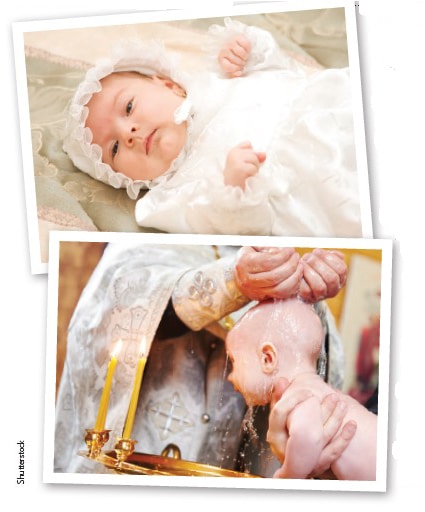 There is evidence that children were being baptized in the Church as early as the second century. An adult parent made a confession of faith for the child, was the child’s sponsor and provided assurance that the child would be brought up as a Christian. By the fifth century, St. Augustine had proposed that someone other than a parent act as a child’s baptismal sponsor, someone who could provide Christian direction for the child in event of the parent’s death. By the eighth century, it was common practice to have a sponsor other than the parent, a godparent. The use of the term in a child’s baptism evolved into usage in adult baptism.
There is evidence that children were being baptized in the Church as early as the second century. An adult parent made a confession of faith for the child, was the child’s sponsor and provided assurance that the child would be brought up as a Christian. By the fifth century, St. Augustine had proposed that someone other than a parent act as a child’s baptismal sponsor, someone who could provide Christian direction for the child in event of the parent’s death. By the eighth century, it was common practice to have a sponsor other than the parent, a godparent. The use of the term in a child’s baptism evolved into usage in adult baptism.
The prerequisites of a sponsor (godparent) for an infant baptism are the same as for an adult (see Canon Law sidebar). While adults seeking baptism can select their godparents, such responsibility rests with the parents of the infant.
The godparent for an infant takes on a lifetime commitment: Should the parent be unable or unwilling to raise the child in accordance with the precepts of the Catholic Church, then the godparent(s) assumes that responsibility. The Church expects the godparent to live in such a manner that demonstrates the virtues taught by our Lord Jesus. The Ritual RCIA book states that, “It is the responsibility of the godparent to show the candidate how to practice the Gospel in personal and social life and to be for the candidate a bearer of Christian witness and a guardian over growth in baptismal life.” (Note: The Church uses the term “candidate” here to identify the one to be baptized, a candidate for baptism.)
At an infant baptism, the role of the godparent doesn’t end, it begins. It is not simply a sweet, nice thing to be part of, but an obligation. During the baptismal ceremony, the godparent answers the question as to whether or not they understand it is their duty to assist in raising the child. When they answer in the affirmative, the answer becomes a promise, a bond that the parents, the child and the Church expect to be fulfilled. The candle that is lit during every baptism is accompanied by the words: “Parents and godparents, this light has been entrusted to you to be kept burning brightly.”
In our mobile society today, it is impossible to ensure that any of those involved won’t someday move or even go separate ways, thus many parents factor in these possibilities when selecting godparents. Prayer and discernment, discussions with the pastor and attending parish baptismal instructions before commitments are made are important for both parents and godparents.
The seriousness with which the Church perceives the role of godparents is exemplified in the Catechism of the Catholic Church, which describes godparents as “firm believers, able and ready to help newly baptized — child or adult — on the road to Christian life. Their task is a truly ecclesial function (officium)” (No. 1255).
Sponsor requirements and responsibilities: Catechumen
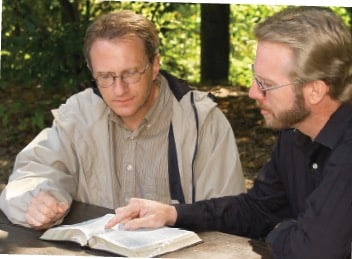
Canon Law (872-74) establishes prerequisites for a Catholic sponsor (godparent) of a catechumen (see Canon Law sidebar below).
Certain sponsor responsibilities are identified in the RCIA ritual book (The Liturgical Press, $34.95) as well as by the individual diocese and parish. Common, notional responsibilities of the sponsor include attending Mass with the catechumen, participating in some or all RCIA classes, introducing the catechumen to other parishioners, inviting the catechumen to parish events, spending time with them in prayer, discussing Mass readings and participating in the RCIA rites and ceremonies. Always, the intent of the classroom and the sponsor is not only to teach the catechumen the tenets of the Faith, but expose them to the Christian life and bring them into a relationship with Jesus Christ.
Today’s formal RCIA process has four parts: Evangelization and Precatechumenate; Catechumenate; Purification and Enlightenment; and Mystagogy.
All parts of the process are marked by optional or obligatory ceremonies detailed in the RCIA ritual book. During these ceremonies, the sponsor often stands behind the catechumen, placing his or her right hand on the catechumen’s right shoulder, symbolizing continuing support, confidence and encouragement.
At the end of the Evangelization and Precatechumenate period, the time especially set aside for discernment, the well-prepared inquirers and their sponsors participate in a parish Rite of Acceptance ceremony. Here, the inquirers are accepted as catechumens and the sponsors verbally affirm their willingness to assist them in their faith journey. The sponsor often actively participates in the ceremony by making the sign of the cross over the catechumen’s forehead, ears, eyes, lips, heart, shoulders, hands and feet, which, along with the blessing of the priest, strengthens the person’s senses for his or her new life as a catechumen.
| Canon Law 872-74 |
|---|
|
“Can. 872 Insofar as possible, a person to be baptized is to be given a sponsor who assists an adult in Christian initiation or together with the parents present an infant for baptism. A sponsor also helps the baptized person to lead a Christian life in keeping with baptism and to fulfill faithfully the obligations inherent in it.
Can. 873 There can be only one male or one female sponsor or one of each.
Can. 874.1. To be permitted to take on the function of sponsor a person must:
1/ be designated by the one to be baptized, by the parents or the person who takes their place, or in their absence by the pastor or minister and have the aptitude and intention of fulfilling this function;
2/ have completed the sixteenth year of age, unless the diocesan bishop has established another age, or the pastor or minister has granted an exception for a just cause;
3/ be a Catholic who has been confirmed and has already received the most holy sacrament of the Eucharist and who leads a life of faith in keeping with the function to be taken on;
4/ not be bound by any canonical penalty legitimately imposed or declared;
5/ not be the father or mother of the one to be baptized.
874. 2 A baptized person who belongs to a non-Catholic ecclesial community is not to participate except together with a Catholic sponsor and then only as a witness of the baptism.”
|
The Rite of Acceptance marks the catechumen’s formal entrance into the order of Catechumenate, the next part of the RCIA process, which lasts for several weeks. When the period of Catechumenate is ended, the catechumen may replace his or her sponsor with a different individual, a godparent. This change is not obligatory; the original sponsor can also serve as the godparent.
Godparents accompany the catechumen at the parish’s optional Rite of Sending, during the obligatory Rite of Election at the diocesan cathedral and through all the remaining RCIA activities. The individual(s) named as godparent(s) must satisfy the requirements of canon law and be approved by the parish pastor.
At the Rite of Election, in the third part of the RCIA process, the godparent affirms before the bishop the readiness, commitment and moral character of the catechumen, “that they are worthy to be admitted to the sacraments of Christian initiation” (RCIA ritual book, No. 552).
Approved by the bishop, the catechumen is now known as the elect, and from that point the godparent offers guidance through the days of Lent and participates at the three Scrutinies, the elect’s baptism during the Easter Vigil and in the final period of RCIA, Mystagogy.
The ritual book explains that “Godparents are chosen … on the basis of example, good qualities and friendship, delegated by the local Christian community and approved by the priest. It is the responsibility of godparents to show the candidates how to practice the Gospel in personal and social life, to sustain the candidates in moments of hesitancy and anxiety, to bear witness and to guide the candidates progress in baptismal life” (No. 11).
(Note: The term “candidate” is used here to indicate that this person is being considered for baptism; not to be confused with a baptized Christian, a candidate, seeking to join the Church.)
Sponsor requirements and responsibilities: Adult baptized candidate

The Catechism of the Catholic Church says, “Candidates for Confirmation, as for Baptism, fittingly seek the help of a sponsor” (No. 1311).
The selection and responsibilities of a sponsor for a baptized adult, a candidate, are similar to those of a catechumen, but the formation period of the candidate may be of a shorter duration.
A candidate can be received into the Church whenever the sponsor, the pastor and others judge them to be ready.
One other noticeable difference from the catechumen is that the candidate and sponsor do not actively participate in the liturgical ceremonies included for a catechumen. Those ceremonies are part of baptismal preparation and the candidate has already been baptized; thus he or she has a sponsor, but not a godparent.
The sponsor stands with the candidate when the candidate is received into the Church during The Rite of Reception of Baptized Christians into the Full Communion with the Catholic Church, as well as during any optional or combined parish ceremonies acknowledging the candidate:
“At the [Rite of Reception], the candidate should be accompanied by a sponsor and may even have two sponsors. If someone has had a principal part in guiding or preparing the candidate, he or she should be the sponsor” (RCIA ritual book, No. 483).
The Code of Canon Law specifically addresses the role of a confirmation sponsor:
“Insofar as possible there is to be a sponsor for the person to be confirmed; the sponsor is to take care that the confirmed person behaves as a true witness of Christ and faithfully fulfills the obligations inherent in this sacrament” (No. 892).
“It is desirable to choose as sponsor the one who undertook the same function in baptism” (No. 893.2).

